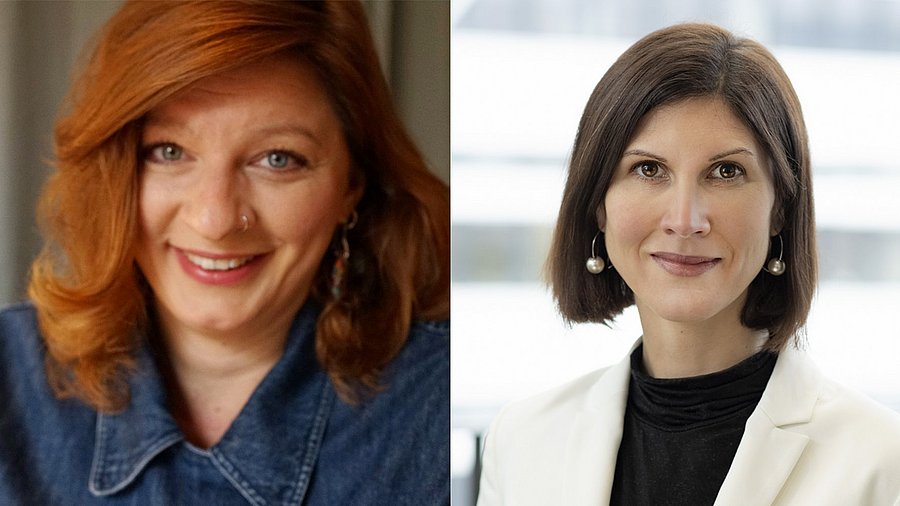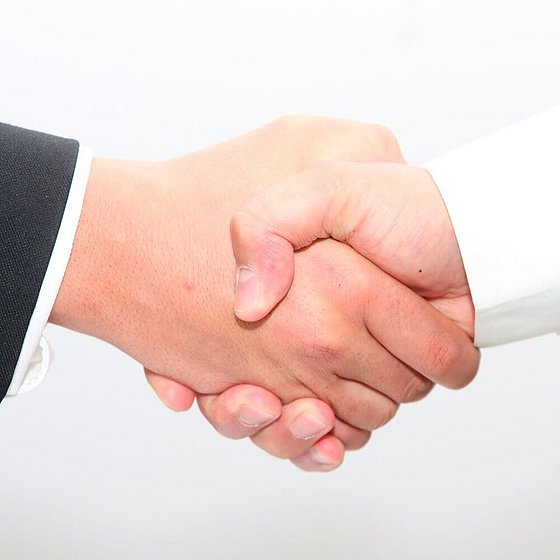
Left: Katharina Andrea Kalthoff / Researcher in the research group "Doing Trust".
Right: Prof. Dr. Cécile Stephanie Stehrenberger / Science and Technology Studies
Photo Stehrenberger: Friederike von Heyden
Photo Kalthoff: Private
How do trust practices work?
Prof. Dr. Cécile Stephanie Stehrenberger and Katharina Andrea Kalthoff on the interdisciplinary project "Doing Trust".
"As an interdisciplinary research group, we are investigating practices, techniques and strategies of trust in a time associated with escalating crises and catastrophes," says humanities scholar Katharina Kalthoff, who, together with Professor of Historical-Comparative Science and Technology Studies Cécile Stehrenberger and other colleagues from a wide range of disciplines, wants to find out how trust practices function in these times.
A finding process
The discovery process took several semesters, explains Stehrenberger, because the topic of trust interests many scientists with different disciplinary approaches. In the end, a smaller group was formed, which then set priorities in which, among other things, coping with disasters and practices for doing so are examined. "That's a process, and that's where you can see how research goes."
"Currently, 'Doing Trust' at Bergische Universität includes literature and cultural studies, philosophy, history, psychology, as well as civil protection and computer science," Kalthoff explains, and Stehrenberger adds, "It doesn't really get much more interdisciplinary than that, and that makes it exciting and attractive. It's important to look at such a topic from a variety of perspectives. Of course, this challenge also lets us learn things about 'thinking together' that we are convinced will be beneficial not only for this project, but also for other projects related to the university and urban society." In addition, since 2020, the 'Doing Trust' working group has also met each semester to foster group discussion across disciplinary boundaries, discuss texts together, and provide opportunities to consider their own projects from the perspective of trust and distrust.

Handshake
Photo: Pixaby
From the workshop on campus to the evening event in the city center
Already in the initial phase, the project organizers offered workshops on the topic of 'Trust, Crisis, Catastrophe' on campus, among others, in order to find out how trust practices function against a precarious background. For this purpose, they invited external national and international trust researchers to the Bergische Universität in addition to scientists of the group, who presented their projects and findings. "In the coming winter semester, we will be looking at the connection between genre and trust in the Doing Trust WG," Kalthoff continues. Genres such as the political essay, theater, the feminist science fiction novel, and cross-genre storytelling all offer topics that are particularly well-suited to address questions of trust as well as questions of mistrust, he said. Those outside the university who are interested are also welcome to attend. "We know, of course, from the experience of other workshops that you also have to get out there to reach interested citizens*," Stehrenberger says. In doing so, he says, it's important to think about new formats that need to be adapted to a more diverse audience. "We have now also dared to take the step of going out into the city in the evening, as a supporting program of workshops, so to speak." Previous events at Wuppertal's LOCH cultural center on the topics of 'Trust and strangeness/trust' and 'Trust in AI in times of ChatGPT' have been very well received, he said.
Publications have also already emerged from the group, including a special issue of the journal Diegesis, including for example an article on 'Crisis communication using the example of the Chempark explosion in Leverkusen', which is the result of an interdisciplinary collaboration between the departments of history of science and population protection at Bergische Universität, and a forthcoming issue of the Kulturwissenschaftliche Zeitschrift.
Host gift
Photo: Pixaby
Shared practices create trust
Trust can be expressed through practices, and we encounter these trust practices in everyday life in our very ordinary interactions, Kalthoff describes the phenomenon. "For example, a trust-building practice can be a host gift or, even more everyday, a handshake. In the case of the latter, the pandemic has shown us how crises change such practices and mark them as practices of trust in the first place," she says, as the handshake was quickly replaced by other gestures of greeting. Whether with an elbow, fist or even legs, people affirmed their sympathy for their counterpart. "And at the same time, the handshake is considered the practice to which we will return. So far, it doesn't seem to be fully 'rehabilitated.' But touch can foster trust." Verbal communication also builds trust, the professor adds. Another trust-generating practice, she says, has become walking together, especially during the pandemic. Says Kalthoff, "Walking the immediate environment every day not only provided exercise during the pandemic, but we also cognitively remapped and experienced the environment. Thus, trust practices are not just about interpersonal relationships: "We also understand trust practices in a broader sense as a network of social and material components. This can also mean shared narratives."
Trusting work with AI and ChatGPT?
Multiple options and challenges arise in science communication when, for example, ChatGPT (a text-based dialogue system that allows chatting with a technical system ed.) is used to summarize and explain knowledge. "I would say that concerns that it is becoming easier and easier to plagiarize are certainly justified, because these take on a new quality through the possibilities on ChatGPT," says Kalthoff, "but with ordinary copies or partial copies, text professionals, such as teachers*, can quickly figure it out and recognize whether something is self-written or not." With AI, of course, it is somewhat more difficult, although the humanities scholar points out that it is now a matter of sounding out common rules for use, because: "As was already the case with the Internet, search engines and Wikipedia, in the case of AI, too, it will be a matter of using it productively and in a framed way in the classroom and creating a sensitivity for opportunities and risks, instead of starting from a fundamental skepticism towards students.
In science, the main issue is how science is understood in the first place, Stehrenberger adds. "Who is doing it? Who is even an author and who is not? It's about how to handle it well. Dealing with it in the context of school and university, for me, also means asking what leads persons to determine an excessive, no longer acceptable recourse to this technique. It is about the structural conditions of learning and research. Science and the science-technology-public relationship are continuously changing. To analyze and discuss exactly which transformations are taking place and how is fundamentally of great social relevance. The discussion of the ChatGPT "problem" can provide a good opportunity to intensify the corresponding activities.
With AI, the creative moment is missing
Literary and scientific writing cannot be replaced by AI. Although the algorithm in ChatGPT in particular is very genre-proof, Kalthoff knows, and job applications and e-mails can be written wonderfully with it, "the literary texts first seem ridiculous when they are written with the AI. That's because ChatGPT doesn't use direct speech, for example. You can try this out. If you give the task: 'Write a ghost story set in 18th century England', then the genre is fulfilled approximately by setting and plot, but in a funny, because flat and striking way. It takes some knowledge of the algorithm and how it works, but also some genre knowledge to get anything sensible out of it. The questions need to be well posed and informed. Ultimately, what's missing is the variation or difference that allows for the creative moment." In scientific writing, ChatGPT will certainly play a role as a tool, but there is also good scientific practice that we can continue to rely on, he said. He said we need to integrate AI into everyday life in a meaningful way and keep questioning what lies behind an enchantment à la 'AI will take over humanity.' "If we look at it historically, we also see parallels to other technical and scientific developments that came along as a kind of black box and were initially incomprehensible to consumers*, Stehrenberger says.
Trust through mistrust
Catastrophes such as man-made climate change, ecological and social crises, the Corona pandemic or the military escalations in Ukraine and the terror in Israel are frightening and lead to shocks in various trust relationships. How then can trust be re-established? Kalthoff explains it with the opposite: "Not only trust, but also mistrust (one is not the opposite of the other) can be understood as an active attitude. It is important to distinguish between destructive, fomented mistrust, as we experience in right-wing populism (or in 'lateral thinking'), and productive mistrust. Productive distrust can also lead to a more intense engagement with discourse, so that a different, better, because informed, trust can emerge." The focus also needs to move away from the trusting person to who or what is actually perceived as trustworthy, Stehrenberger adds, continuing, "In this, social structures and power relations within which practices of trust take place play a crucial role. We ask ourselves, and therefore the aspects of crisis/catastrophe as described above are central for us, whether practices of trust cause shifts or whether they stabilize the prevailing relations."
For more information on the project and the Doing Trust WG, visit https://doingtrust.uni-wuppertal.de/de
Uwe Blass
Dr. Cécile Stephanie Stehrenberger is Junior Professor for Historical-Comparative Science and Technology Studies, IZWT at the University of Wuppertal Katharina Andrea Kalthoff holds a PhD in English and is a research associate in the Doing Trust research group at the Faculty of Humanities and Cultural Studies at BUW.
